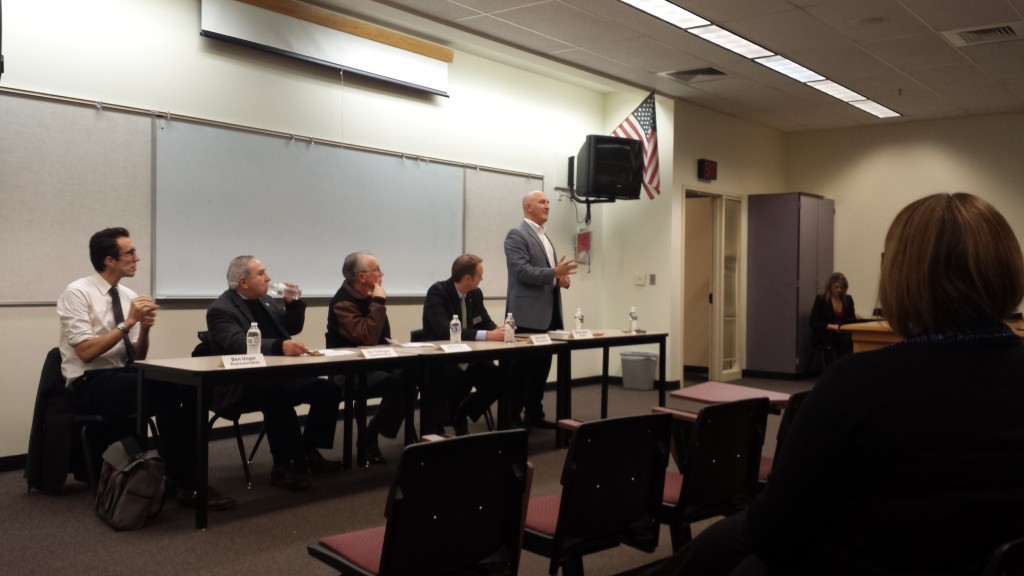Ruffling a Few Feathers About The Lack of School Funding
We all believe that children are our future. We all feel like education is important. And yet our schools are terribly underfunded.
I’m not in the business of getting into a back-and-forth about school funding formulas, Common Core standards, tax breaks for corporations, school bonds, bickering legislators and all that jazz. All worthy issues, but, just not gonna get into it here.
All I know is that when we were in suburban Chicago, Logan’s kindergarten class had 18 students and four iPads. There was extra reading support, ESL support and other awesome services.
Then we came to Portland. One of my neighbors warned me of the local elementary school, saying the quality was sub-par because of the big class sizes and outdated technology. Naturally, I freaked. No one wants to send their kid to a “bad school.”
I put my journalism cap on (well, actually I don’t think it ever comes off, maybe I just straightened it a bit.) We headed over to the school for a self-guided summer tour. I ran into the principal and got a chance to grill him for a good 30 minutes about the school: Its goals, challenges, what he’d like to see from parents, the school’s racial and economic background and how the differences between the haves and havenots play out in daily school life.
Two big things about the school shocked me. One, Logan’s class has 26 kids and everyone was celebrating that as a good thing, saying it was a “small” class. It’s all a matter of perspective. Oregon has the nation’s third-largest average class size.
The second shocker was the old computer lab. It’s filled with old desktop computers that appear to be circa 2002. Did I mention Intel is like, 5 miles up the street? Anyway, on Back to School Night, I approached a woman I thought was with the school’s booster club and we had a meeting of the minds on school funding. Turns out she was school district board member. We’re now buds.
I quickly learned that my direct approach can be startling to the kind ol’ folks here in the Pacific Northwest. Especially when you’re talking about education. At a neighborhood block party a few months ago, I was trying to understand the education system from a teacher’s standpoint, so asked some of my neighbors who teach at a different school why the funding was so poor and what they thought would help fix the problems.
I got quite the chilly reception, then a complete freeze out. Got it. Lesson learned.
So I got involved with the booster club, have helped raise money and am just trying to get a grasp of how things operate here.
A couple days ago, the aforementioned board member sent me an invite to an education town hall on school funding that featured five state legislators: Sen. Bruce Starr and Reps. Jeff Barker, John Davis, Joe Gallegos and Ben Unger. I scrambled for a sitter (Hubby was working late) and went.

State Reps. Ben Unger, Joe Gallegos, Jeff Barker, John Davis and state Sen. Bruce Starr speak at an education town hall.
I swear to you, I had all the intention of just listening to what folks had to say. I even sat on the far side of the room so I could watch both the legislators and the crowd. After an hour and a half, I had learned a lot about what various people thought we should do and opinions on failures past and present. But then I started to twitch, especially with the thank yous for coming out and the thank yous for having us.
Huffing to myself I think, I am paying a babysitter a pretty penny, I want to come away with something meaty. I once-again straightened up that journalism cap and formulated my question. Being how politicians like to speechify, I also decide to give them a time limit.
When I raised my hand to speak, the district’s superintendent, who was the moderator, called on me.
“I have a question that I’d like for each of you to answer in less than one minute. I’m new here from Chicago, so I’m not as nice as as you folks and I will cut you off.” (Earlier the superintendent said each person would be limited to a three minute intro and he let them yammer on and on. And on.)
“What bill that relates to school funding has the best chance of being passed?” I asked. “To help you save on your time, you can just give me the bill number because I’m writing it down. What are its biggest challenges and how can we help, other than to call your local legislator?”
The room fell silent.
So I go, “Who wants to go first?”
There was some slight stammering, but they found their footing. Most of the politicians pointed to a bill to be floated by Rep. Gallegos, which from my understanding is to review how the state is implementing its various assessments such as standardized testing and benchmarks related to Common Core. According to the audience and legislators, that process is rife with error and expensive inefficiency. Others on the panel also talked about increasing funding of the Career and Technical Education program.
Nothing earth-shattering, I know and I was chomping at the bit to ask follow-ups. But these measures are more steps in the much-needed right direction.
According to an Education Week analysis, Oregon’s public schools are ranked 42 out of the 50 states and the District of Columbia. Clearly, there’s a lot of work that needs to be done.


Wow. My mouth is open. And I’m cracking up at your “brashness.” Being from NY, I suffer from the same affliction. Haha.
You know James, you strike me as such an uncouth, blunt jerk. Typical New Yorker… Kidding. Yeah, this whole kid gloves thing is definitely a new experience for me. Let’s call it a growth opportunity, right? 🙂
I was at this meeting. I was the teacher who spoke in favor of CCSS (which is different than standardize testing), but stated my child’s kindergarten class has 32 students. This battle has been going on for a decade. What does it say to our children when they walk into a classroom with 32 students? I see it on their faces, it says, “you are not important and we don’t care about you.” It is unbearable to see. I’ve thought of lea
ving teaching bit quickly realize, leaving will jot solve the problem. All I can do is work as hard as I can to connect with each h of my own students. Thank you for your perspective, and unapologetic directness, they need it. Welcome to Oregon!
Wow! Hello! I do remember you. I enjoyed what you had to say and thought you approached it quite gently, especially considering the emotion-filled mom of three who is struggling with CCSS changes. I’m like you, I have thought many times about leaving our school, but leaving doesn’t help. So still not sure how I can help, but I’m trying where I can. Thank you so very much for your comment. I’m curious as to how you found my little corner of cyberspace, but am so glad you did. 🙂
You rock. I love the fact that you asked how you can help (vs. just complaining or pointing fingers as most people do in these forums), and that you did your research and educated yourself about what is going with education in your area and how it compares around the nation. We need more individuals who are knowledgeable about the realities of education.
Thanks Ginny, I’ve always found complaining something that’s good over wine. You know whine with wine, but in a meeting where there’s people who can implement change, it seems like a waste of time to bellyache. Sure pinpoint what’s wrong, but let’s focus on solutions, it only makes sense to me. Troublesome how many people only want to complain in such forums.
New Yorkers aren’t brash–we’re just straight forward 😉
I was thinking about the educational system in New York City and how the implementation if the Core is not really working (along with charter schools and the like) and I was informed by several teachers that, any method would work with:
• Smaller class sizes.
• Removal of difficult (behavioral) students.
• Giving those who need additional instruction (Special Education) an environment that would benifit them.
And this is talking to teachers who are in the trenches! The merit pay, and firing teachers in the middle of the school year because they aren’t teaching the test fast enough is a huge disservice to our children! I’m glad that you asked these questions and demanded some answers.
I feel like Children cannot learn if their environment says otherwise.
You. Are. So. Right. The environment of our kids has to be much better to make a marked difference in their education. I can’t imagine being a teacher, ever, but especially these days. I applaud all those who are trying so hard to make a difference. The items that you mentioned, class size and addressing students with behavioral or special needs seems to be universal concerns. I’m just hopeful that enough people prioritize education instead of just saying that they do and we can get more money into schools to help our students.
And yes, I love the honesty of New Yorkers one of the many things that make it the greatest city on Earth. I mean that.
I just came across this while searching through other Portland bloggers and LOVE this post. I used to teach in the public school system in California and then in Clackamas and then I ran after school interventions in Portland and now I still work in education, but not in a traditional classroom. However, I have one school age child and two more that will be there soon and I have MANY opinions about schools. My daughters Kindergarten in CA had 19 students, her PPS first grade class has 32. I struggle almost every day sending her to class that large where she complains it is “too loud” and “too boring” which I can see by the amount of worksheets she brings home. I could go on and on and on about this (as a parent and as a teacher) but I mainly just wanted to say that I appreciated this post and I am a new follower 🙂
Sorry for the delayed response, but thank you so very much for your comment. I’ve go back and read this one a few times because folks here are still sensitive about having discussions on how to make it better. I figure you’re either part of the problem or part of the solution and I’m just trying to figure out how I can best help make things better. I’m not one of those who charges forward without first understanding what’s already been tried and also what the people on the ground floor think is needed. Anyway, just wanted to say thanks, thanks and so much thanks! 🙂
Pingback: Who says you can’t talk about race, religion and gender? | She's Write